10 Best CRM with Appointment Scheduling Apps Worth Trying 2026
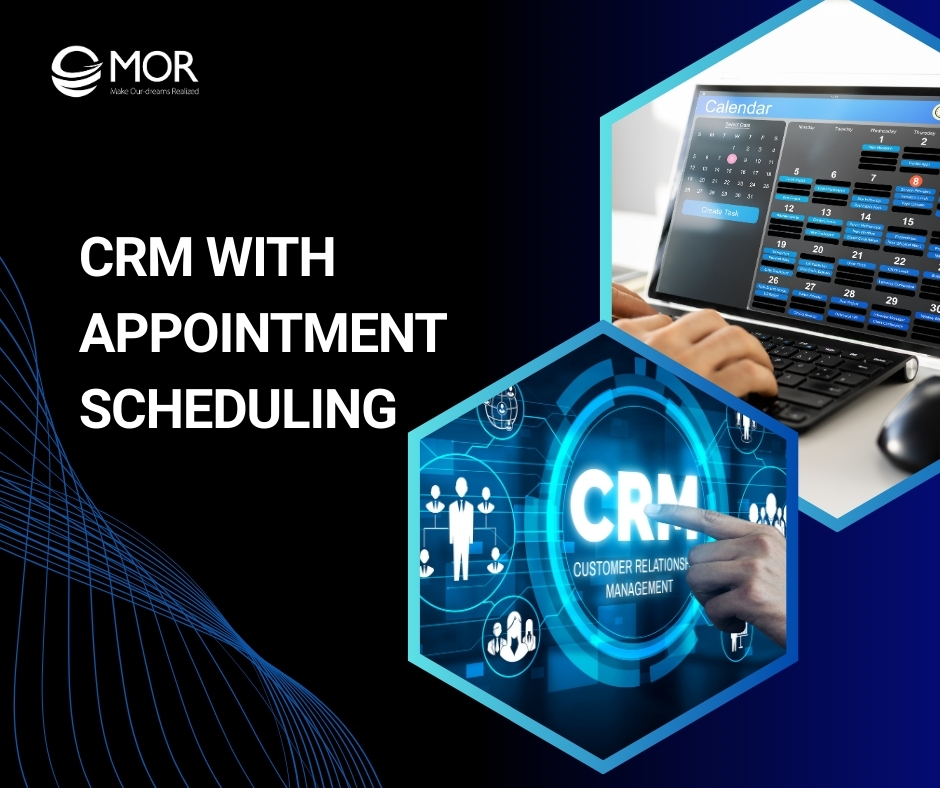
Managing clients and meetings can get messy without the right tools, which is why many businesses rely on a CRM with appointment scheduling. The right platform streamlines booking, syncs calendars, and keeps customer data organized. This guide from MOR Software highlights the top options in 2025 to help you pick a solution that truly fits your business needs.
What Is CRM With Appointment Scheduling?
CRM with appointment scheduling brings customer management and time management together in one platform. On the CRM side, it records and organizes client data, including leads, contact details, communication history, and personal preferences. On the scheduling side, it lets businesses and customers arrange meetings, services, or consultations in a structured way without relying on separate systems.
This type of CRM scheduling software makes it easy to display available time slots online, handle bookings or cancellations, and sync calendars in real time across tools like Google or Outlook. Businesses can configure working hours, set meeting or service types, block off unavailable periods, and allocate staff or resources efficiently. Automated reminders help lower no-show rates, while flexible booking rules give both customers and teams more control.
Every scheduled meeting is directly tied to customer records, so staff can quickly view prior conversations, notes, or specific requirements before the interaction. This connection improves personalization and saves time.
In short, a CRM and scheduling software solution simplifies operations, reduces admin tasks, enhances the client journey, avoids double bookings, and supports stronger follow-ups that lead to higher conversion rates.
Work rarely stays at a desk z anymore. A mobile-friendly app or responsive interface lets clients and staff book, confirm, or adjust appointments on the go. Easy mobile access is now an expectation, not just a bonus, in any modern CRM with scheduling platforms. Mobile accounted for about 60% of global web traffic in August 2025. This strengthens the need for mobile-first booking.
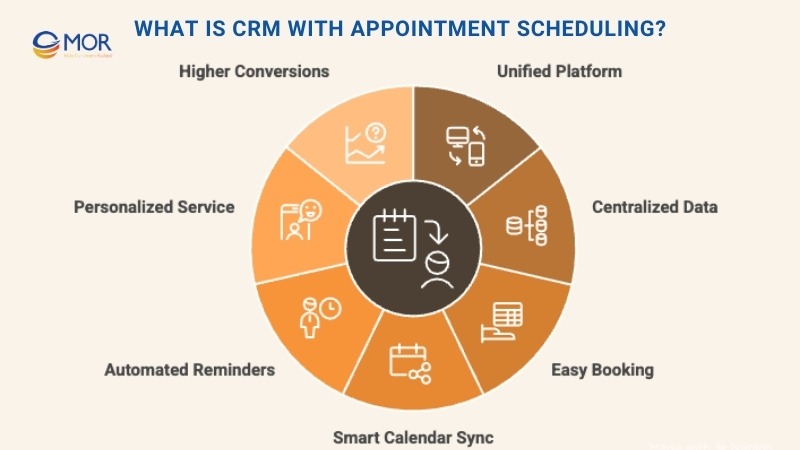
Top 10 CRM With Appointment Scheduling Platforms in 2026
We’ve reviewed the leading tools that combine customer management with scheduling. Below are the top CRM with appointment scheduling platforms worth exploring in 2025.
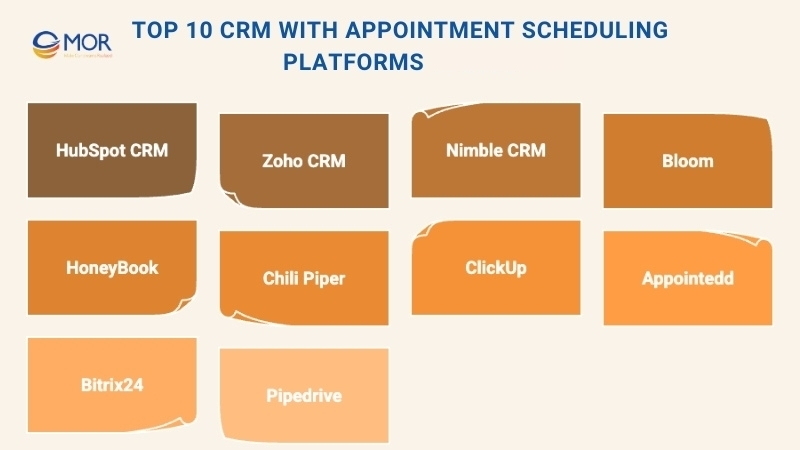
1. HubSpot CRM
HubSpot brings together marketing, sales, and customer support in one ecosystem, and it also includes a strong scheduling tool. This makes it a good option for companies that want a CRM with appointment scheduling baked directly into their core system rather than using a separate app.
The scheduling function works through shareable booking links that can be sent by email or embedded on a site. Once a client chooses a slot, it instantly syncs with Google Calendar or Office 365, helping avoid conflicts. Each booking ties back to the customer profile, so staff have complete context before meetings.
Teams can view past interactions, active deals, or support cases before calls. This connection between the CRM schedule and customer records helps deliver more informed conversations and smoother service.
Key features
- Customizable booking pages aligned with your brand
- Fair distribution of team schedules
- Built-in video meeting links
- Automated reminders via email
- Intake forms to capture details before meetings
- Mobile access for scheduling on the go
Pricing plans
- Free plan: Basic CRM with simple scheduling
- Starter: $20/month for 2 users
- Professional: $890/month for Marketing Hub, $450/month for Sales Hub
- Enterprise: From $3,600/month for Marketing Hub
Key considerations: HubSpot’s free version covers the basics but is limited. The advanced scheduling tools, like team booking and deep integration, sit behind paid plans. Pricing can feel steep since it applies to full HubSpot hubs, not just the scheduling add-on.
Ideal for: Organizations that want scheduling fully tied to their CRM and have budget for premium features.
Overall impression:
- Great all-in-one system for marketing, sales, and scheduling
- Clean, user-friendly interface
- Strong automation and reporting options
- Costs rise sharply between plans
- Contracts are annual at higher levels
- Many advanced functions require pricey upgrades
- Can feel overwhelming for teams that just need simple schedule CRM functionality
2. Zoho CRM With Zoho Bookings
Zoho CRM is known for being flexible, budget-friendly, and easy to scale as companies grow. For scheduling, it pairs seamlessly with Zoho Bookings, which plugs straight into the CRM to build a smooth workflow.
When customers reserve a slot, the details sync automatically into their CRM record. This way, every appointment brings full context, including client history, preferences, and prior notes. Teams don’t need to jump between tools, making the system a strong option for those who want CRM with appointment scheduling connected end to end.
The setup is boosted by AI, which tailors the booking dashboard to your business model. It adapts terms for staff, resources, and meeting types, helping you get started quickly without heavy manual work. This combination of CRM with scheduling and automation saves time and reduces friction.
Key features
- Custom booking pages styled to your brand
- Multi-calendar sync for Google, Outlook, and more
- Flexible rules for hours, breaks, and availability
- Built-in payment collection before meetings
- Team scheduling and resource management
- Defined cancellation policies and booking windows
- AI-assisted configuration for faster launch
Pricing plans
- Zoho CRM: From $14 per user/month
- Zoho Bookings: Basic at $8/month, Premium at $12/month
Key considerations: Together, they deliver strong value compared to expensive all-in-one platforms. You can start small with basic tools and expand later without overspending.
Ideal for: Businesses that want CRM and scheduling software with solid functionality at an accessible price point.
Overall impression:
- Transparent and affordable pricing tiers
- Eliminates long email chains with self-service booking
- Smooth link between CRM and CRM booking system
- AI setup improves speed and accuracy
- Supports payment handling before appointments
- Marketing automation is less advanced than premium tools
- Interface can look dated compared to rivals
- Some setup effort is needed compared to plug-and-play systems
3. Nimble CRM
Nimble is designed around relationship management and includes scheduling features that support sales and outreach. Unlike platforms that only focus on tracking data, Nimble emphasizes building stronger connections with clients through its CRM with appointment scheduling tools.
It blends contact enrichment with scheduling so you get more context for every meeting. The system automatically pulls in social media profiles, email addresses, and other key details for your contacts. This saves time on research and ensures meetings are better informed.
The “Today Page” dashboard centralizes your calendar, pipeline, tasks, and email performance in a single view. This makes it easier to manage your CRM schedule, prioritize what matters most, and cut down on switching between apps.
Key features
- Automatic contact enrichment with social profiles
- Extensions for Gmail and LinkedIn
- Unified inbox combining email and scheduling
- Activity tracking for appointments and tasks
- Flexible workflows with automation
- Email sequences for structured follow-ups
Pricing plans
- One plan: $24.90 per user/month with full functionality
Key considerations: Nimble keeps things simple with one all-inclusive plan. That means no hidden costs or confusing feature tiers.
Ideal for: Small businesses and sales teams that need relationship-driven schedule CRM software, especially those who spend a lot of time prospecting on social channels.
Overall impression:
- Flat pricing with everything included
- Smooth integration with Google Workspace and Microsoft 365
- Browser extensions bring scheduling into your daily workflow
- Contact enrichment saves time gathering data
- Strong mix of relationship tools and scheduling
- Fewer advanced scheduling features than dedicated apps
- Some setup needed for best efficiency
- Geared more toward sales use cases than service appointments
- Booking customization is basic compared to standalone schedulers
4. Bloom
Bloom is built for freelancers and independent professionals who want an end-to-end system for managing clients. It combines lead capture, CRM with appointment scheduling, contracts, and payments into one streamlined process.
What sets Bloom apart is its focus on converting prospects quickly. Instead of endless back-and-forth, it uses booking forms that include service selection, agreements, and upfront payment, turning interest into commitment faster.
The booking tool syncs with your calendar to avoid conflicts. You can set working hours, block off dates, and even create dedicated time slots for different services. This flexibility helps professionals manage their CRM booking system while keeping schedules under control.
Key features
- All-in-one booking forms with service packages
- Integrated contract signing during scheduling
- Built-in payment collection
- Calendar sync with customizable availability
- Embedding options for websites and social media
- Personalized booking links for various services
- Client relationship tools and history tracking
- Automated follow-up email campaigns
Pricing plans
- Basic: $14/month
- Professional: $34/month
- Premium: $66/month
Key considerations: Even the entry plan includes the essentials, with higher tiers unlocking more automation and customization.
Ideal for: Freelancers, coaches, photographers, and solo service providers who want a smooth appointment making software with payments and contracts in the same flow.
Overall impression:
- Strong integration of scheduling, contracts, and payments
- Easy embedding on websites and profiles
- Goes beyond scheduling with client management
- Flexible availability settings by service type
- Professional presentation that builds trust
- Primarily suited for individuals and small teams
- CRM tools outside scheduling are more limited
- Collaboration options are basic
- Integrations with third-party apps are fewer compared to larger platforms
5. HoneyBook
HoneyBook delivers a full CRM platform with integrated scheduling designed for freelancers and service businesses. It covers the client journey from first booking through project completion, making it more than just a CRM with appointment scheduling tool.
Scheduling is tied directly to contracts, payments, and automated workflows. Clients can reserve a time slot, sign agreements, and make deposits all in one process. This connection between bookings and business operations helps keep projects organized and professional.
The system offers flexible options for managing availability. You can create multiple session types, assign durations, define meeting locations, and add buffer times between appointments. Custom booking forms and branded pages also give businesses a polished, client-friendly look.
Key features
- Branded booking pages tailored to your business
- Session types with varied lengths and locations
- Integrated contracts and payment processing
- Time buffers before or after appointments
- Personalized confirmations and reminders
- Automated workflows triggered after bookings
- Dedicated client portals for communication
Pricing plans
- Starter: $19/month
- Essentials: $39/month
- Premium: $79/month
Key considerations: All plans include the main scheduling features, with advanced automation and branding options available on higher tiers.
Ideal for: Event planners, coaches, creatives, and other professionals who want a schedule CRM solution that manages long-term client relationships, not just one-time appointments.
Overall impression:
- Strong end-to-end client experience
- Branding options highlight your identity
- Automation cuts down on admin work
- Scheduling links directly to contracts and payments
- Client communication is well tracked
- Learning curve is steeper than simpler tools
- Pricing is higher than basic booking apps
- Some limits for larger teams with complex structures
- Interface can occasionally be tricky
- May feel more extensive than very small teams require
6. Chili Piper
Chili Piper is built with B2B sales teams in mind, offering smart scheduling designed to speed up deal cycles and improve lead conversion. Its core strength is using AI to make CRM with appointment scheduling more intelligent, ensuring the right meetings happen with the right people.
The platform prioritizes high-value leads and automatically routes them to the right team members. Instead of wasting time on manual coordination, sales teams can focus on conversations that matter. Prospects can also schedule instantly from your site, marketing emails, or other touchpoints, reducing drop-offs before a meeting is booked.
By combining AI, automation, and deep CRM integrations, Chili Piper helps sales-driven organizations cut through scheduling friction and move opportunities forward faster.
Key features
- AI-driven meeting optimization
- One-click booking from emails or websites
- Lead routing and round-robin team distribution
- Automated rescheduling options
- Strong Salesforce and HubSpot integration
- Accurate time zone detection
Pricing plans
- From $15/user/month for basic scheduling
- Premium plans for growing teams
- Enterprise-level packages available
Key considerations: Pricing can get tricky, as different tiers unlock different capabilities depending on team size and use case.
Ideal for: B2B sales teams that want automated appointment scheduling to improve lead handling and already work within Salesforce or HubSpot.
Overall impression:
- Tailored for revenue-focused teams
- AI ensures smarter meeting assignments
- Easy booking process that minimizes friction
- Intelligent routing improves lead management
- Works smoothly with top CRM platforms
- Less relevant for non-sales industries
- Servers based in the US may raise compliance questions
- Interface is English-only
- Pricing model is complex compared to simpler tools
- Setup requires learning advanced routing rules
7. ClickUp
ClickUp treats scheduling as part of a wider productivity and project management platform. Instead of being just an appointment making software, it integrates scheduling directly with task management, workflows, and collaboration tools.
Appointments can trigger follow-up tasks, link to active projects, and be tracked alongside deliverables. This setup gives teams a unified view where schedules, projects, and outcomes connect in one system. For businesses that want both CRM with appointment scheduling and project tracking in a single space, ClickUp offers a strong blend.
The scheduling tools also fit into team calendars, making it easy to view availability, coordinate across departments, and align meetings with broader projects. This flexibility helps teams manage client work and internal deadlines without switching platforms.
Key features
- Tasks automatically linked to scheduled meetings
- Custom forms for collecting booking details
- Automation workflows triggered by appointments
- Team calendar views with shared availability
- Project-based organization for schedules
- Sync with external calendar systems
- Mobile apps for managing schedules anywhere
Pricing plans
- Free: Basic scheduling with limited features
- Unlimited: $7/user/month
- Business: $12/user/month
- Enterprise: $19/user/month
Key considerations: ClickUp’s scheduling is just one part of a full work management suite. For teams only looking for CRM and scheduling software, the platform might feel heavy.
Ideal for: Teams wanting scheduling tied directly into task tracking and larger project workflows.
Overall impression:
- Strong integration of scheduling and task management
- Competitive pricing given the scope of features
- Automation tools support complex workflows
- Good collaboration support for teams
- Mobile apps enhance flexibility
- May be too advanced for simple scheduling use cases
- Learning curve for mastering all functions
- Scheduling tools are less specialized than standalone apps
- Can feel like more system than some businesses require
8. Appointedd
Appointedd positions itself as a flexible online scheduler that blends booking and CRM functions. It’s designed to deliver personalized experiences, making CRM with appointment scheduling more client-focused.
Every appointment automatically generates or updates a customer profile. These records capture booking history, preferences, and notes, giving businesses a full picture of client interactions. This structure makes the platform more than a scheduler—it works like a lightweight CRM booking system.
The booking flow is customizable, letting you add form fields or questions to capture the exact details you need. Required or optional fields ensure businesses collect the right information without overwhelming clients.
Key features
- Automatic profiles with booking history and details
- Customizable forms with flexible fields
- Notes and preferences stored in client records
- Digital audit trails for bookings and communication
- Messaging directly from customer profiles
- Team calendar management and resource allocation
- Marketing tools that draw from booking data
Pricing plans
- Self-serve: From $22/month per bundle (1 user, 1 calendar)
- Enterprise: Tailored pricing with added support and insights
Key considerations: The entry plan includes branded reminders, unlimited booking widgets, and a quick setup process. Enterprise packages add account management and quarterly reporting.
Ideal for: Businesses that want a customizable schedule CRM platform with strong client data management capabilities.
Overall impression:
- Highly customizable booking experience
- Strong client data focus with automatic profiles
- Tracks history and preferences in detail
- Messaging and marketing tools built in
- Flexible enough for teams and solo providers
- Advanced tools may feel excessive for small businesses
- Some users find setup complex
- Not as tailored to niche industries as competitors
- Integration list is shorter than larger platforms
- Interface design feels a bit dated compared to newer tools
9. Bitrix24
Bitrix24 approaches scheduling as part of a full business collaboration suite. Instead of focusing only on bookings, it combines CRM with appointment scheduling and team management features to support organizations of all sizes.
Its standout feature is “open slots,” which lets colleagues view availability and book without long back-and-forth messages. For distributed teams, built-in time zone awareness ensures meetings are set correctly across different regions. This makes Bitrix24 a practical CRM and scheduling software option for global teams that need both collaboration and booking tools in one place.
Recurring events, instant meeting launches, and integrations with iCalendar extend its flexibility. Mobile access means teams can manage calendars on the go, while confirmation options via SMS, messenger, or email give participants clear reminders.
Key features
- Shared team calendars with permission settings
- Open slots for simplified scheduling
- Automatic time zone detection
- Recurring meeting support
- Instant online meetings from calendar events
- iCalendar syncing with external systems
- Mobile scheduling access
- Multiple confirmation channels
Pricing plans
- Free: Basic scheduling with limited users
- Basic: $49/month for 5 users
- Standard: $99/month for 50 users
- Professional: $199/month for 100 users
- Enterprise: $399/month for 250+ users
Key considerations: Pricing is based on organization size rather than individual users, which can be more cost-effective for scaling teams.
Ideal for: Companies that want schedule CRM functionality as part of a broader collaboration tool, especially those with global or multi-location teams.
Overall impression:
- Goes beyond scheduling with full collaboration tools
- Organization-based pricing helps larger teams save
- Strong internal coordination features
- Reliable time zone management reduces errors
- Free plan available for smaller needs
- Mobile apps support flexible scheduling
- Wide set of features may feel overwhelming
- Higher learning curve than niche booking apps
- Scheduling options less specialized than dedicated platforms
- Occasional reports of performance slowdowns
- Might be excessive for businesses needing only simple booking
10. Pipedrive
Pipedrive is a sales-driven CRM that includes a meeting scheduler built to tie directly into the sales pipeline. It’s a CRM with appointment scheduling solution focused on turning prospects into customers by keeping meetings aligned with deals and activities.
The scheduler integrates with contact records and email threads, so you can propose times directly during outreach. Once a meeting is confirmed, it links back to the related deal in your pipeline, giving sales teams full visibility. This structure turns appointment management into part of the overall sales process rather than a separate task.
Users can share availability in two ways: recurring “general availability” blocks or “specific times” tailored for particular meetings. This makes it easy to balance ongoing schedules with one-off opportunities. The tool also syncs with external calendars to prevent double bookings and connects with popular video platforms for remote sales calls.
Key features
- Direct link between scheduler and sales pipeline
- Calendar sync to avoid overlaps
- Zoom, Google Meet, and Teams integration
- Buffer times between meetings
- Customizable fields for meeting details
- Embeddable booking options on websites
- Email integration for availability sharing
Pricing plans
- Lite: $14/user/month (no scheduler included)
- Growth: $39/user/month (limited to one booking link)
- Premium: $49/user/month (unlimited links)
- Ultimate: $79/user/month (full scheduler access)
Key considerations: Scheduling is locked behind Growth and higher plans, with full access requiring Premium or Ultimate subscriptions.
Ideal for: Sales teams that want schedule CRM tools connected directly to pipelines, where most appointments tie to deal progression.
Overall impression:
- Strong integration with sales workflows
- Cuts down scheduling back-and-forth
- Calendar sync lowers risk of double-bookings
- Automated reminders help reduce no-shows
- Improves sales visibility with deal-linked meetings
- Not included in entry-level plan
- Growth plan restricts users to one booking link
- No payment options within the scheduler
- Limited customization compared to standalone booking apps
- Focused only on deals, not leads
- Lacks team scheduling across shared calendars
Must-Have Features in CRM With Appointment Scheduling
Finding the right CRM with appointment scheduling can save time and make client interactions smoother. But not every tool delivers what businesses actually need. The best ones don’t just handle bookings, they tie into workflows, client data, and daily operations. Below are key features worth prioritizing when choosing your platform.
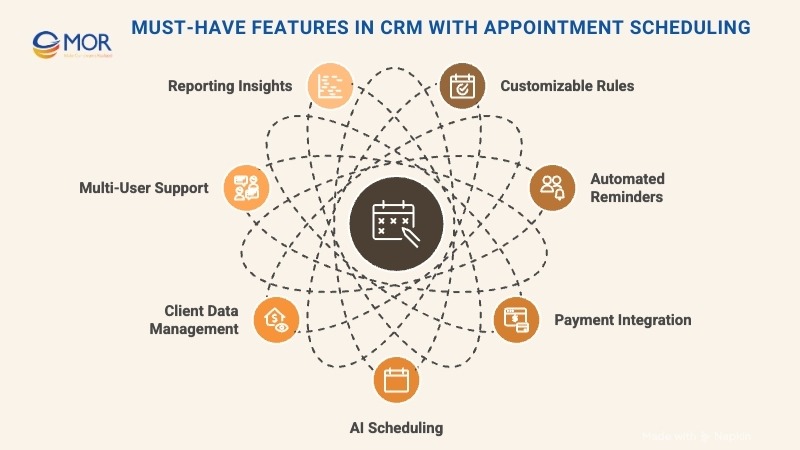
Customizable Booking Rules
Flexibility matters. A strong CRM schedule tool should let you create booking rules that match your business needs. That could mean setting specific time slots, limiting the number of appointments per day, or enabling recurring bookings. If you’re managing different services or staff, customization helps prevent overlap and confusion. It also gives customers a clear path to schedule while keeping your team in control.
Automated Reminders
Missed appointments disrupt workflows and waste valuable time. That’s why the best CRM with appointment scheduling includes built-in reminder features. Notifications can be sent by email, SMS, or app alerts, making it harder for clients to forget their bookings. Automated reminders cut down on no-shows, keep your calendar steady, and remove the need for constant manual follow-ups. Through automating this simple task, your team can stay focused on delivering service instead of chasing confirmations.
Payment Integration
For businesses that charge for services, payment handling should connect directly to your CRM with appointment scheduling. A good system lets clients pay upfront using secure methods like credit cards, PayPal, or digital wallets. This creates a smoother booking flow since customers can confirm and pay in one step. It also reduces the need for manual invoicing or chasing late payments. With integrated transactions, you gain efficiency, clients enjoy convenience, and your records stay accurate.
AI-Powered Scheduling
Modern CRM with appointment scheduling platforms often include AI to simplify time management. These tools analyze your availability, workload, and past booking patterns to suggest the best meeting times. By automatically spacing out appointments, AI reduces the risk of burnout and helps maintain a balanced schedule.
Client Data Management
Strong scheduling tools double as lightweight CRMs by storing valuable customer details. Beyond just bookings, they keep track of contact info, past appointments, and personal preferences. This makes it easier to personalize services, anticipate client needs, and strengthen long-term relationships. With complete records linked to every appointment set up, you can send targeted follow-ups and deliver a more tailored experience.
Multi-User Support
If you’re managing a team, multi-user functionality is essential in any CRM with appointment scheduling. It allows each staff member to set their own calendar, define availability, and receive notifications without interfering with others. This setup works well for salons, clinics, consulting firms, or any business where multiple professionals handle bookings. It keeps everyone coordinated and reduces the risk of scheduling conflicts.
Reporting and Analytics
The best scheduling systems don’t just book meetings, they also deliver insights. Built-in reporting helps track appointment volume, no-show rates, and busy periods. With this data, you can refine your availability, improve client service, and plan resources more effectively. By turning raw numbers into trends, CRM scheduling software helps you make better decisions and build more efficient workflows.
Centralized Communication
A strong CRM with appointment scheduling should bring everything into one hub—appointments, client records, notes, and conversations. Centralization saves time, reduces switching between tools, and keeps teams focused on the client experience.
Calendar Integrations
Seamless syncing with Google, Outlook, or Apple calendars is essential. Real-time updates prevent double bookings and keep availability accurate. For businesses using a schedule CRM, calendar integrations are key to smooth daily operations.
Mobile Accessibility
Work rarely stays at a desk anymore. A mobile-friendly app or responsive interface lets clients and staff book, confirm, or adjust appointments on the go. Easy mobile access is now an expectation, not just a bonus, in any modern CRM with scheduling platform.
Business Benefits of CRM With Appointment Scheduling
A CRM with appointment scheduling does far more than fill calendar slots. It adds structure, speed, and professionalism to how teams and individuals manage their time. Whether you’re working alone or coordinating across departments, these tools create smoother operations and stronger client interactions.
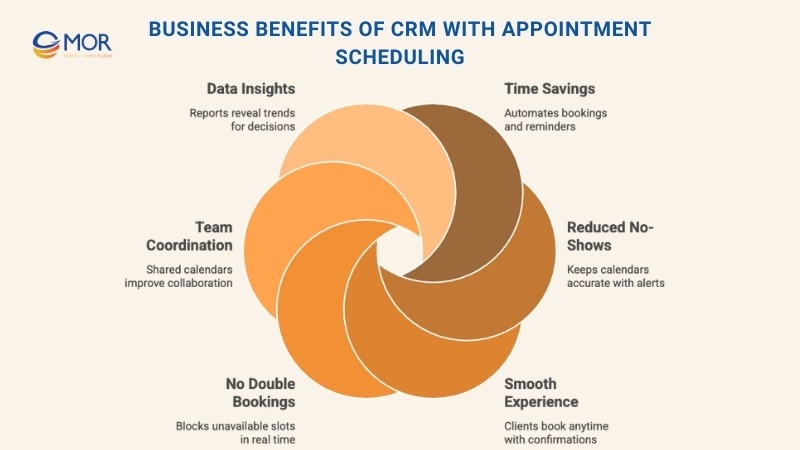
Save Time Through Automation
Manual scheduling often means juggling emails, messages, and spreadsheets. With CRM scheduling software, tasks like booking, rescheduling, and reminders run automatically. This reduces interruptions and lets you focus on work that drives results instead of constant calendar management.
Reduce No-Shows With Reminders
Missed meetings waste valuable hours. Automated reminders by email or text ensure clients remember their bookings and show up on time. This keeps your CRM and scheduling software accurate, your day predictable, and your operations more efficient.
A review from HIMSS found that notification systems, including SMS reminders, commonly reduce missed appointments by about 5 to 10%.
Create a Smooth Client Experience
Clients expect flexibility and ease. A CRM with appointment scheduling lets them book anytime, receive instant confirmations, and make changes without hassle. This convenience not only builds trust but also shows that you value their time.
Prevent Double Bookings
Real-time updates keep calendars accurate. The system automatically blocks unavailable slots, reducing the chance of overlap or last-minute confusion. With a reliable CRM schedule, you can stay confident that your day is organized and free of conflicts.
Improve Team Coordination
For teams, scheduling can easily get complicated. A shared booking CRM platform allows each member to set availability while staying connected to the group. Everyone remains aligned without constant check-ins, improving collaboration and efficiency.
Gain Insights With Reports
A strong CRM with appointment scheduling doesn’t just manage bookings, it also provides reporting tools. You can see peak hours, track cancellations, and spot booking trends.
These insights help you adjust operating hours, plan staffing, or even run targeted promotions. By turning appointment data into actionable information, businesses can make smarter decisions and improve overall efficiency.
In healthcare alone, a 2025 JAMA analysis reported a median of 7.5 patient appointments per physician per day. This shows the value of identifying peak times and staffing accordingly.
Industry-Specific Uses of Appointment Scheduling Software
From medical clinics to gyms, a CRM with appointment scheduling is changing how organizations handle bookings. It reduces admin work, prevents errors, and gives clients a smoother experience. Here’s how different industries put it into practice:
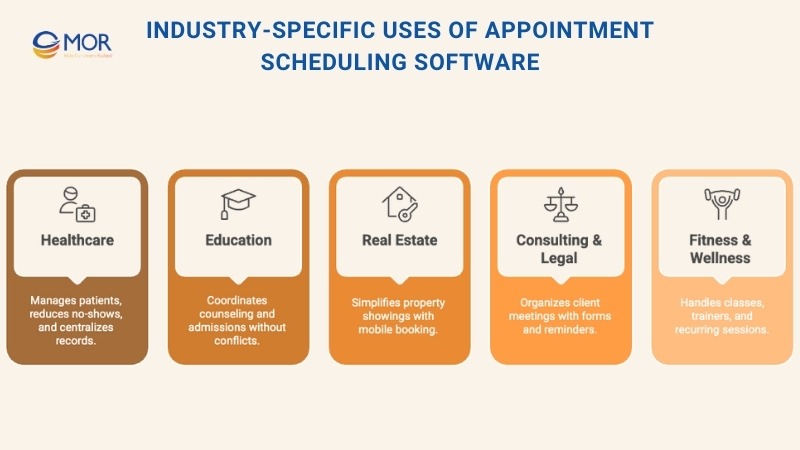
Healthcare: Patient Flow and Efficiency
For healthcare providers, time management is critical. Whether it’s a private practice or a large clinic, doctors rely on appointment making software to let patients book online, receive reminders, and reschedule without needing constant phone support.
These tools sync across calendars and manage availability for multiple providers under one system. That reduces no-shows, prevents double bookings, and centralizes patient information. With scheduling and records in one place, healthcare teams can deliver faster, more reliable care.
Research in 2025 found that appointment nonadherence averaged 25.1% among women reporting childcare barriers, compared with 15.2% among those without such barriers. This highlights why accessible scheduling and reminders are important.
Education: Avoiding Schedule Conflicts
Schools, tutoring centers, and universities rely on CRM with appointment scheduling to manage counseling sessions, admissions interviews, and other student services. Shared calendars and real-time availability make it simple to avoid overlaps and last-minute changes.
Educators and staff save hours thanks to automated reminders and self-service booking. At the same time, students and parents benefit from flexible options that let them choose times that fit their schedules. This balance creates smoother coordination for everyone involved.
Real Estate: Streamlined Showings
Real estate professionals balance property tours, client meetings, and open houses daily. A CRM with appointment scheduling allows buyers to book showings directly, cutting out long email threads or phone calls.
With mobile access, automated confirmations, and calendar integrations, agents can manage their day with less stress. Having client preferences and history tied to each booking also helps deliver more personalized showings, making the process smoother for both agents and clients.
In 2024, 69% of home buyers used mobile or tablet devices during their home search, This aligns with the need for mobile-first showing requests.
Consulting & Legal: Organized Client Meetings
Consultants and legal professionals often juggle multiple cases and client sessions at once. A CRM with appointment scheduling simplifies the process by letting clients book online, complete intake forms, and receive automatic reminders.
With synced calendars, personalized booking links, and even AI-suggested times, these tools cut down on scheduling friction. For firms working across teams or time zones, this level of organization keeps meetings efficient and client time well managed.
Fitness & Wellness: Managing Classes and Sessions
Gyms, studios, and wellness providers use CRM with appointment scheduling to handle both one-on-one sessions and group classes. Clients can secure recurring spots, choose their trainer, and complete payments upfront, making the process smooth from the start.
For businesses, these tools automate reminders, prevent overbooking, and keep staff schedules aligned. The result is fuller calendars, fewer mix-ups, and a stress-free way to manage daily operations.
How to Choose the Best CRM With Appointment Scheduling
With so many tools available, selecting the right CRM with appointment scheduling can feel overwhelming. Taking it step by step makes the process easier and ensures you find a system that truly fits your business.
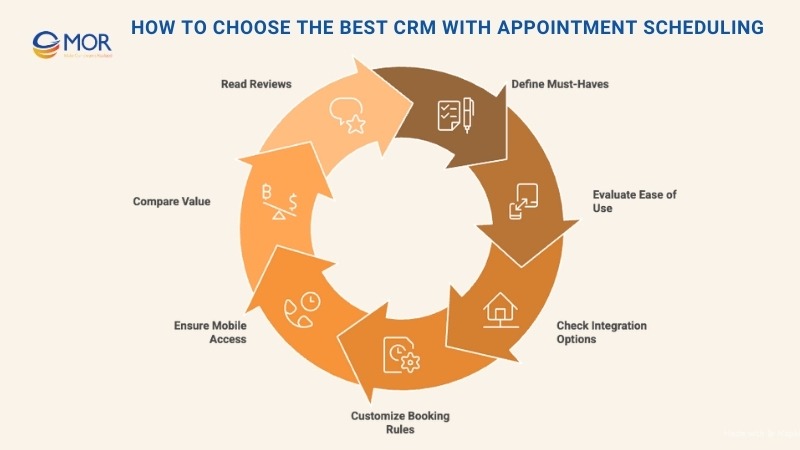
Step 1: List Your Must-Haves
Begin by outlining the non-negotiables. Do you need online self-booking? Automated reminders? Integrated payment options? Are you handling one-on-one meetings, group classes, or multi-user calendars? A clear list helps you compare platforms and focus on the solutions that match your needs best.
Step 2: Look for Ease of Use
A good CRM with appointment scheduling should be simple for both your team and your clients. Features like drag-and-drop scheduling, intuitive navigation, and a clean interface make booking stress-free. When clients can book quickly without confusion, everyone benefits.
Step 3: Check Integration Options
Your scheduling tool shouldn’t work in isolation. The best platforms integrate with calendars, payment gateways, video tools, and email systems you already use. Whether it’s Google Calendar, Outlook, Zoom, PayPal, or your existing CRM with scheduling, seamless connections save time and cut down on manual updates.
Step 4: Prioritize Customization
No two businesses run the same way. The right CRM with appointment scheduling should let you set booking limits, collect client notes, or create recurring sessions with ease. A flexible system adapts to your workflow instead of forcing you to adjust to it.
Step 5: Ensure Mobile Access
Both clients and staff expect to book and manage appointments on the go. Look for a platform that works smoothly on phones and tablets as well as desktops. With a mobile-ready CRM with scheduling, clients can reserve spots anytime, and you can keep control of your calendar between meetings.
Step 6: Compare Pricing to Value
When choosing a CRM with appointment scheduling, don’t just look for the lowest price. Check what each plan includes—reminders, integrations, or team calendars might cost extra. Sometimes paying more upfront saves time and money later. Always test the free trial so you know exactly what you’re getting.
Step 7: Read Reviews Before Committing
See what other businesses are saying, especially those similar to yours. Reviews often highlight ease of use, customer support, and reliability. Pay close attention to comments about setup time, mobile performance, and responsiveness to client needs.
Final Tip: Try Before You Buy
Use demos or trials to test the system in real situations. You’ll quickly see if the CRM with scheduling fits your workflow or simply creates more complexity.
Tailored CRM With Appointment Scheduling Solutions From MOR Software
Many companies start with off-the-shelf CRM with appointment scheduling tools. They work fine for basic needs, but problems appear once businesses try to handle unique workflows, industry-specific rules, or advanced integrations. A generic platform might not capture your full client lifecycle, support complex approval chains, or meet strict security standards. That gap can slow down growth instead of enabling it.
MOR Software bridges this gap by building custom CRM with appointment scheduling systems tailored to each client. Instead of forcing your processes into a pre-made tool, we design platforms that reflect the way your teams already operate. Every feature, from scheduling and reminders to reporting and automation, is created with your business model in mind.
With ISO 9001:2015 and ISO/IEC 27001:2013 certifications, we follow strict quality and security practices. This ensures that sensitive customer data, financial records, and scheduling details are managed safely while your system scales with your operations.
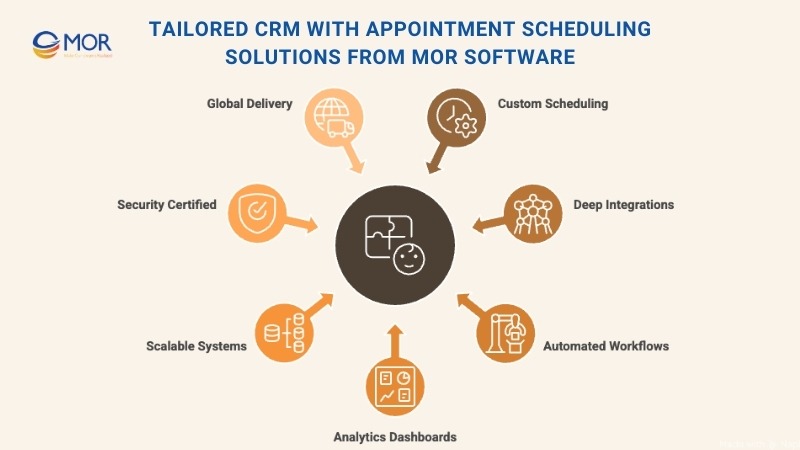
Here’s what sets our custom approach apart:
- Tailored scheduling flows that match your exact business requirements, from healthcare patient visits to corporate client meetings.
- Deep integrations with calendars, HR tools, payment gateways, or existing enterprise software.
- Automated workflows for confirmations, follow-ups, and escalations, reducing manual work.
- Analytics dashboards that show not only booking volume but also employee performance, client retention, and revenue impact.
- Scalability and flexibility, so the platform adapts as your teams, services, and locations expand.
With development teams based in Vietnam and Japan, we combine global delivery experience with cost efficiency. Our engineers and consultants have successfully created Salesforce-based solutions and fully bespoke CRM systems for clients across finance, healthcare, manufacturing, and services.
When standard tools can’t keep up with your requirements, a custom CRM with appointment scheduling from MOR Software gives you the control, security, and scalability you need.
Contact us to start building a system that’s built around your business, not the other way around.
Conclusion
A well-designed CRM with appointment scheduling helps businesses save time, reduce no-shows, and strengthen client relationships while keeping teams organized. Off-the-shelf tools may cover the basics, but they rarely meet complex or growing demands. That’s where MOR Software delivers value with tailored systems that align with your workflows and scale securely. Whether you need automation, deep integrations, or industry-specific features, we can build a solution around your business.
Contact us today to get started.
Rate this article
0
over 5.0 based on 0 reviews
Your rating on this news:
Name
*Email
*Write your comment
*Send your comment
1